Hours before shutdown ends, city manager details the toll it has had on Alexandria
40% of federal workers dipping into savings, food assistance requests surge as city's 13,000 federal employees weather 43-day closure
Just hours before the government shutdown came to an end, City Manager James Parajon told City Council just how big a negative impact the 43-day closure has had on Alexandria, home to at least 13,000 federal employees.
Nearly 40% of federal workers are already dipping into substantial savings to cover expenses, 63% have reduced spending, and the city has seen a significant increase in residents seeking food assistance, Parajon reported Wednesday night.
The presentation came hours before the House voted 222-209 to reopen the federal government, ending the longest shutdown in U.S. history.
“The ongoing federal government shutdown is significantly rattling Americans’ confidence in the financing,” Parajon told council members, citing a national survey conducted Oct. 9-12 by HarrisX for GoDaddy.
The survey showed that nearly 40% of federal employees are already dipping into substantial savings to cover expenses due to the shutdown.
“I know that’s somewhat instinctual, but when you see the percentages, that’s a really significant impact,” Parajon said.
The survey also revealed that 44% of government employees and 29% of all consumers say they are delaying major purchases. Among federal employees, 90% are concerned about the shutdown’s impact, 75% are worried about small businesses, and 73% believe the shutdown could negatively impact consumer spending overall.
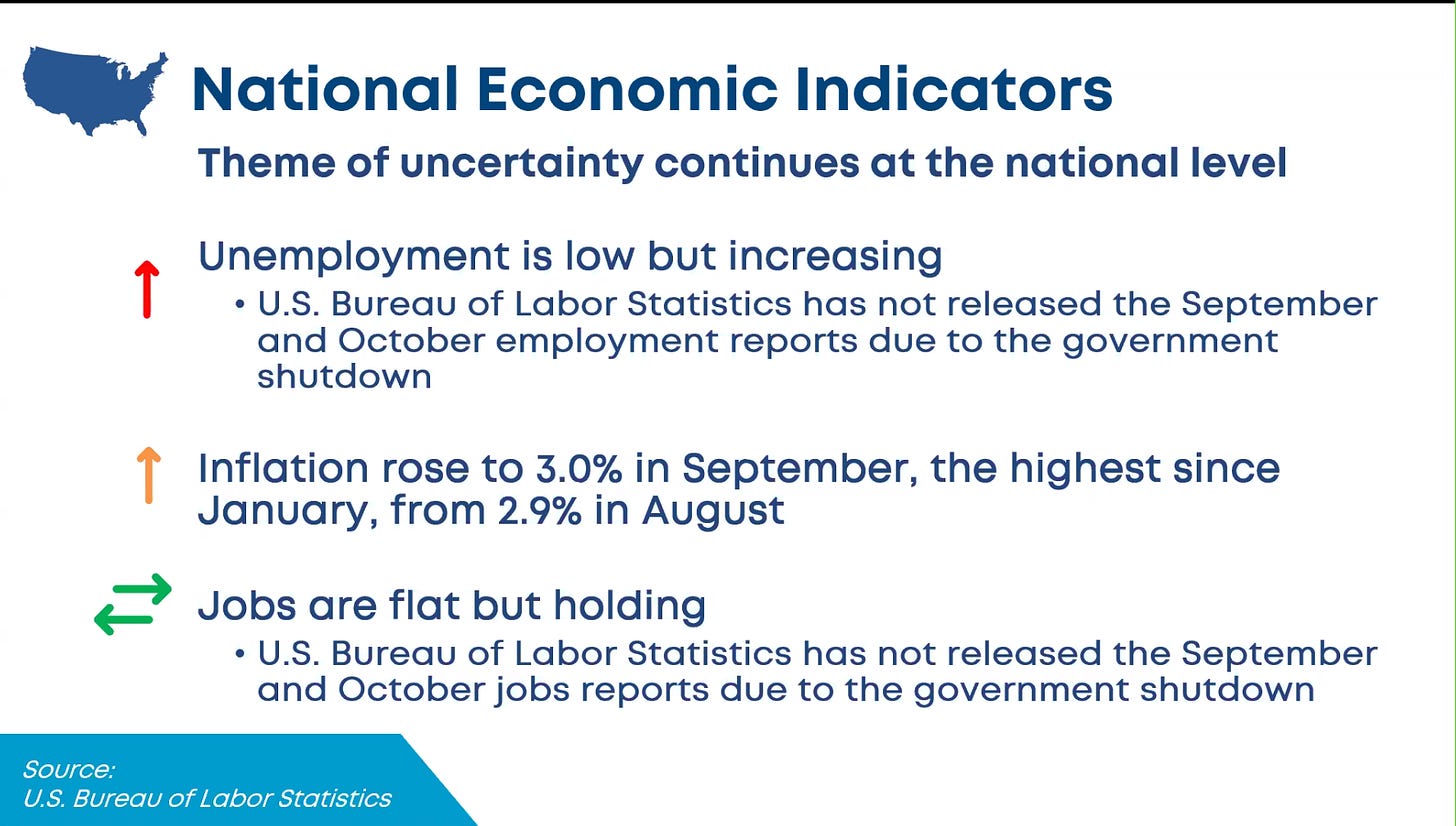
National economic toll mounting
The shutdown — now the longest in U.S. history — is exacting a heavy toll on the national economy. Goldman Sachs and Federal Reserve estimates indicate the shutdown reduces GDP by 0.2% each week it continues, representing an economic loss of approximately $15 billion per week nationally.
A month-long shutdown would result in about 43,000 additional unemployed people nationwide, according to estimates Parajon presented.
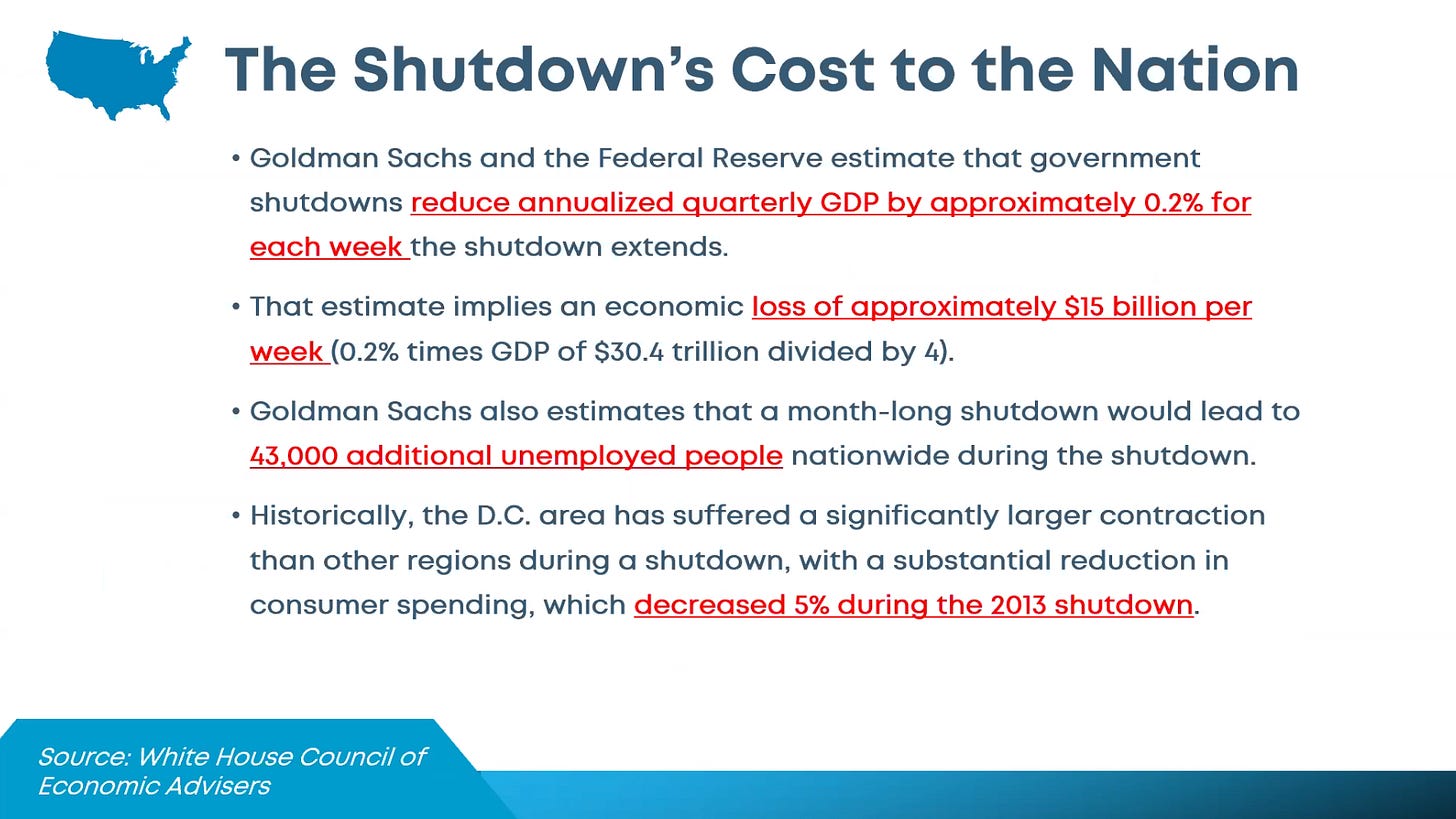
Traditional economic data has become scarce, with the September employment report from the U.S. Bureau of Labor Statistics — originally due Oct. 3 — still unpublished. The Federal Reserve Bank of Chicago estimates that September and October unemployment rates are “slightly higher” than the previously reported 4.4%.
Meanwhile, inflation rose to 3% in September — the highest since January — up from 2.9% in August, according to data Parajon presented.
Virginia particularly vulnerable
Virginia’s economy proves especially susceptible to federal disruptions. About 24% of the state’s economy relies on federal spending, and Virginia has the second-highest number (147,000) and percentage (10% of all workers) of federal employees in the nation.
The state receives $1 in every $7 of federal contracting dollars. In 2024, Virginia received $23.7 billion in federal funding. Local governments in Virginia received around $4 billion, while the state received about $52 billion in federal direct payments to individuals.
Virginia’s gross state product will decline by around $396 million each week the shutdown extends, the equivalent of around $1.7 billion per month, according to White House Council of Economic Advisers estimates. A one-month shutdown could increase unemployment by about 1,200 workers in Virginia.
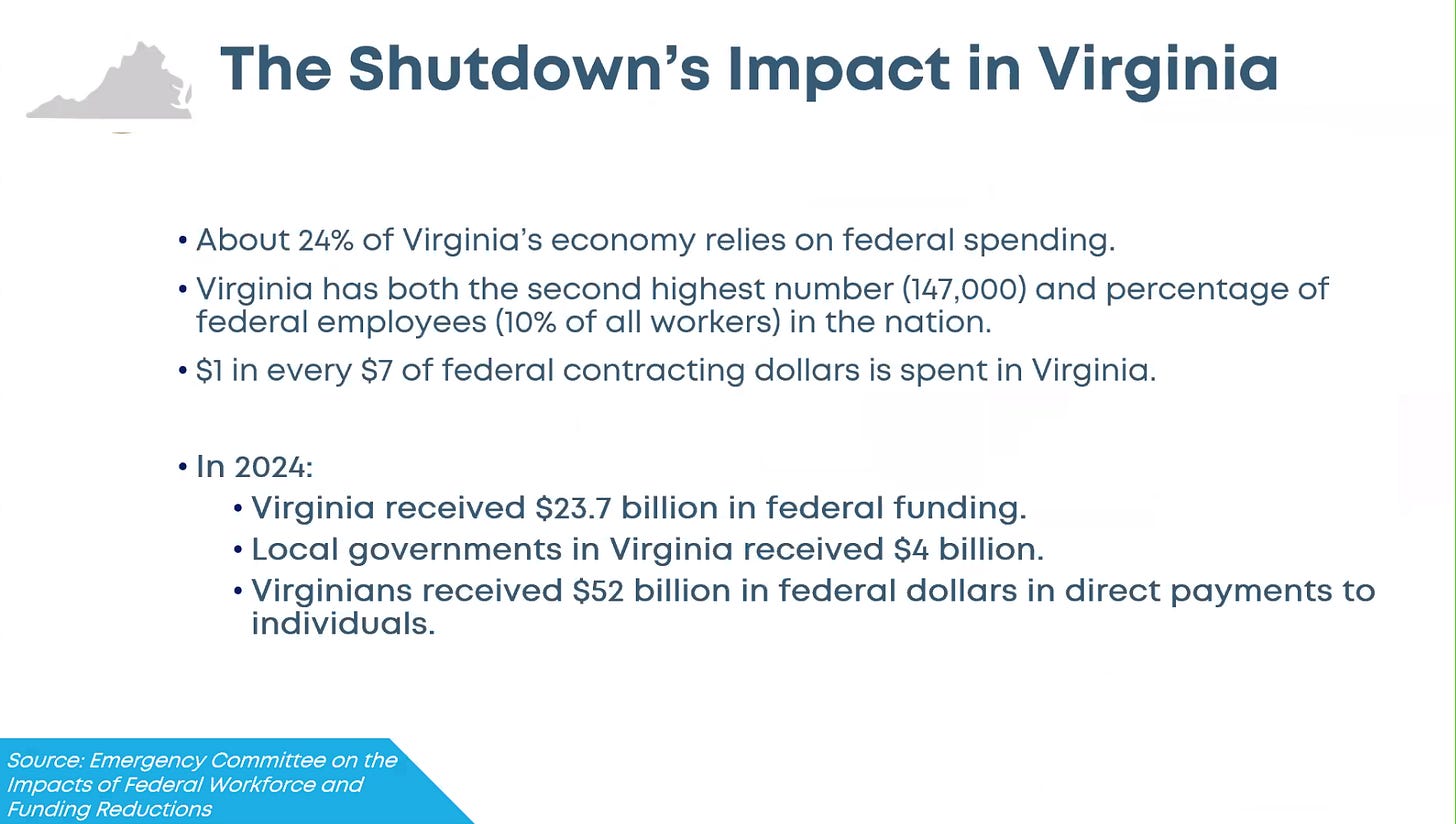
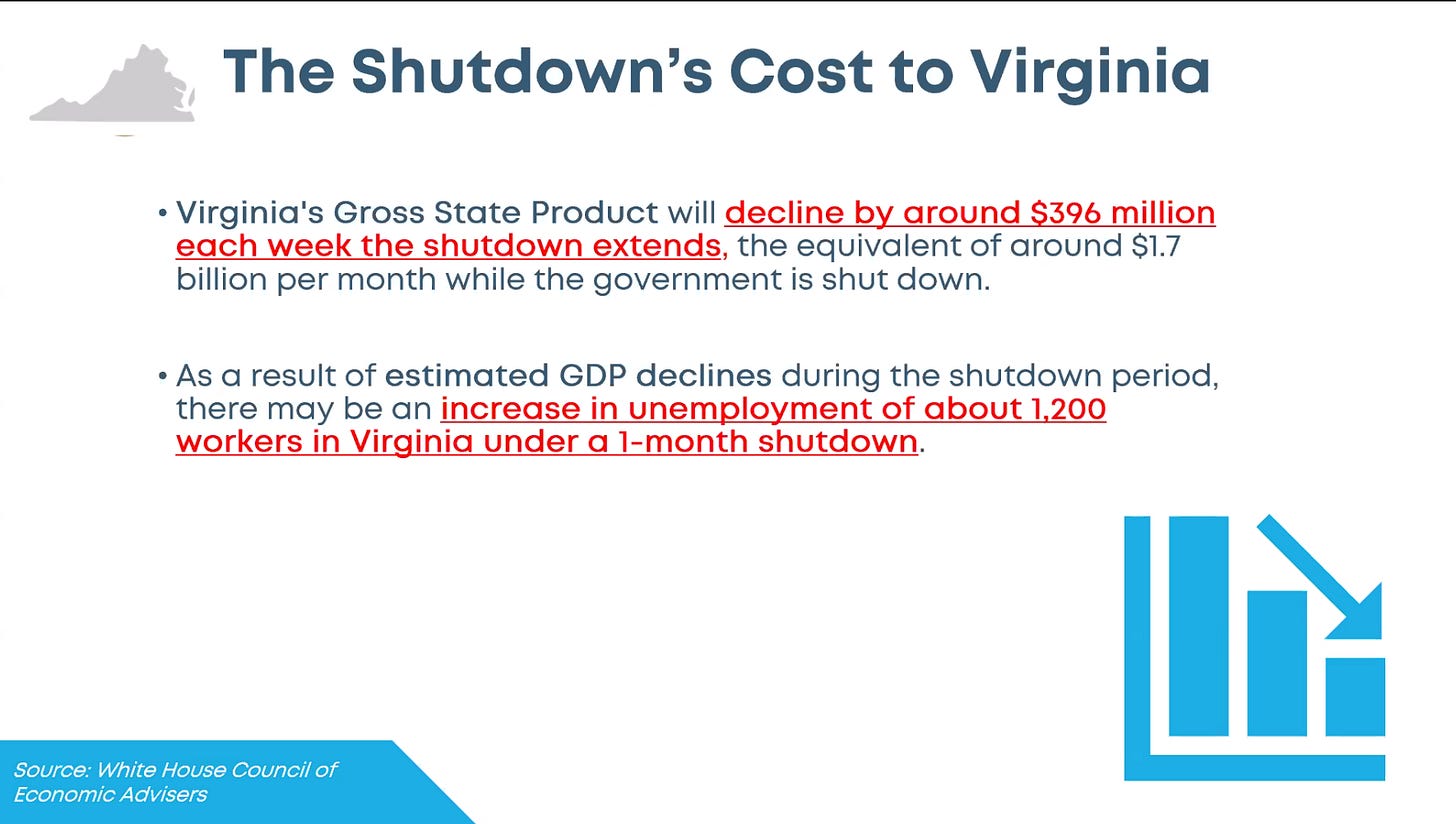
Alexandria, home to at least 13,000 federal employees, faces particular vulnerability. Parajon noted that the number may be underestimated as it doesn’t include federal contractors residing in the city.
“It’s really unclear who’s furloughed. It changes daily. It’s unclear who is receiving a paycheck, although we know military and law enforcement are receiving paychecks and the Patent and Trademark Office is paying staff,” Parajon said.
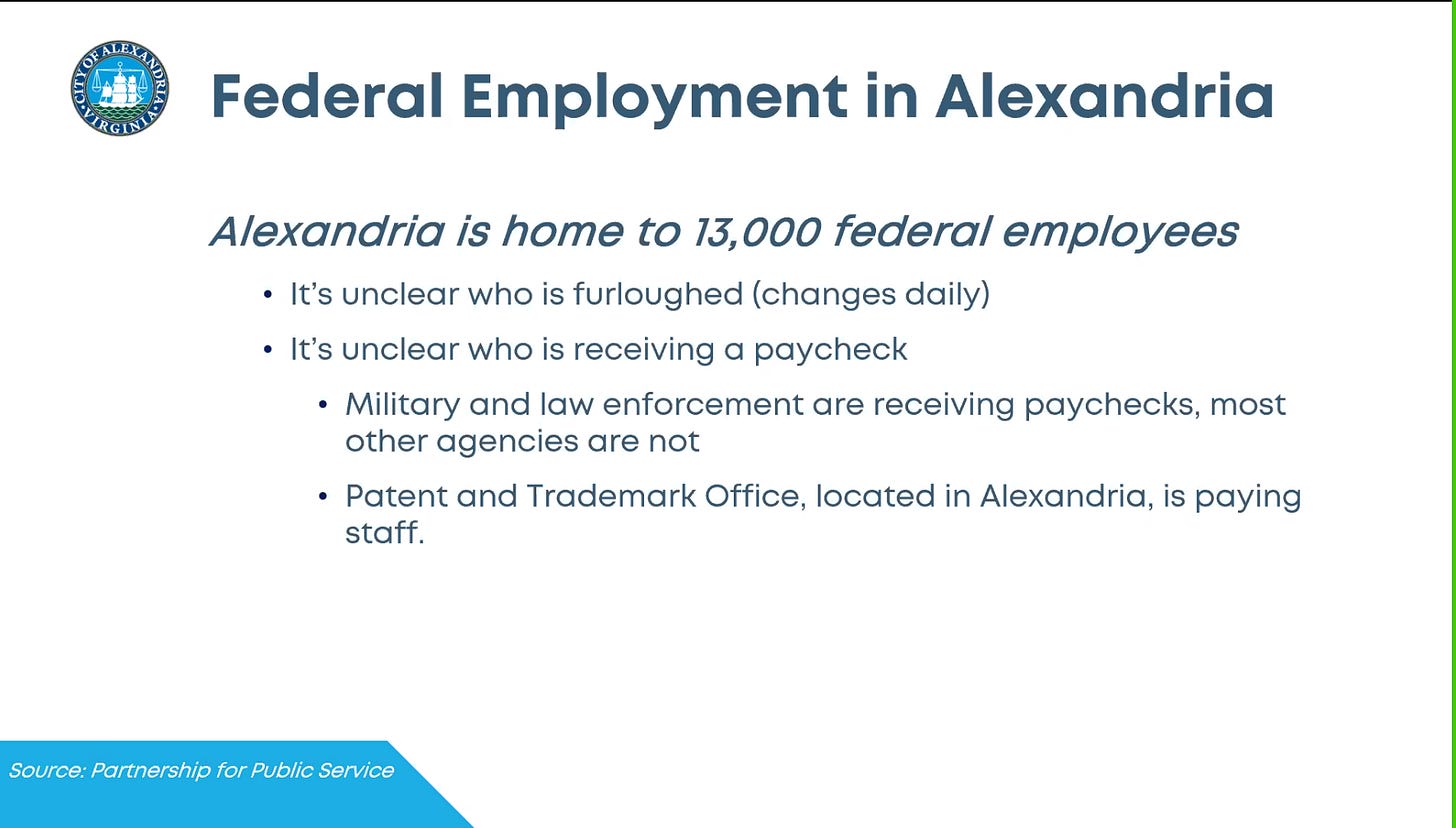
The D.C. metro area historically suffers significantly larger contractions than other regions during shutdowns, with a substantial 5% reduction in consumer spending during the 2013 shutdown.
Social services under strain
Director of Community and Human Services Kate Garvey described the situation with SNAP benefits as “a horrendous experience for so many people.”
“I use the word flux, and I can’t underestimate the impact of how flexible everything has been in terms of the SNAP benefits,” Garvey told the council.
The federal distribution decision has been in flux. Virginia’s approach was planned to shift back to federal funds on Nov. 17. Notice received Nov. 9 stated that 65% of benefits would be released by Nov. 14.
The city organized special, focused food distributions at the Pepper Center, particularly targeting individuals who applied in October but faced approval delays due to the shutdown.
Garvey reported seeing “a pretty significant increase in new folks to the food pantries, also who are identifying as federal workers through the referral systems.”
LIHEAP (Low Income Home Energy Assistance Program) funding remains partially supported through Jan. 30 under the continuing resolution. Applications continue to be accepted until mid-November, though distribution typically begins in December. Delays are possible as federal funding has been paused, and reactivation may take time, according to Garvey.
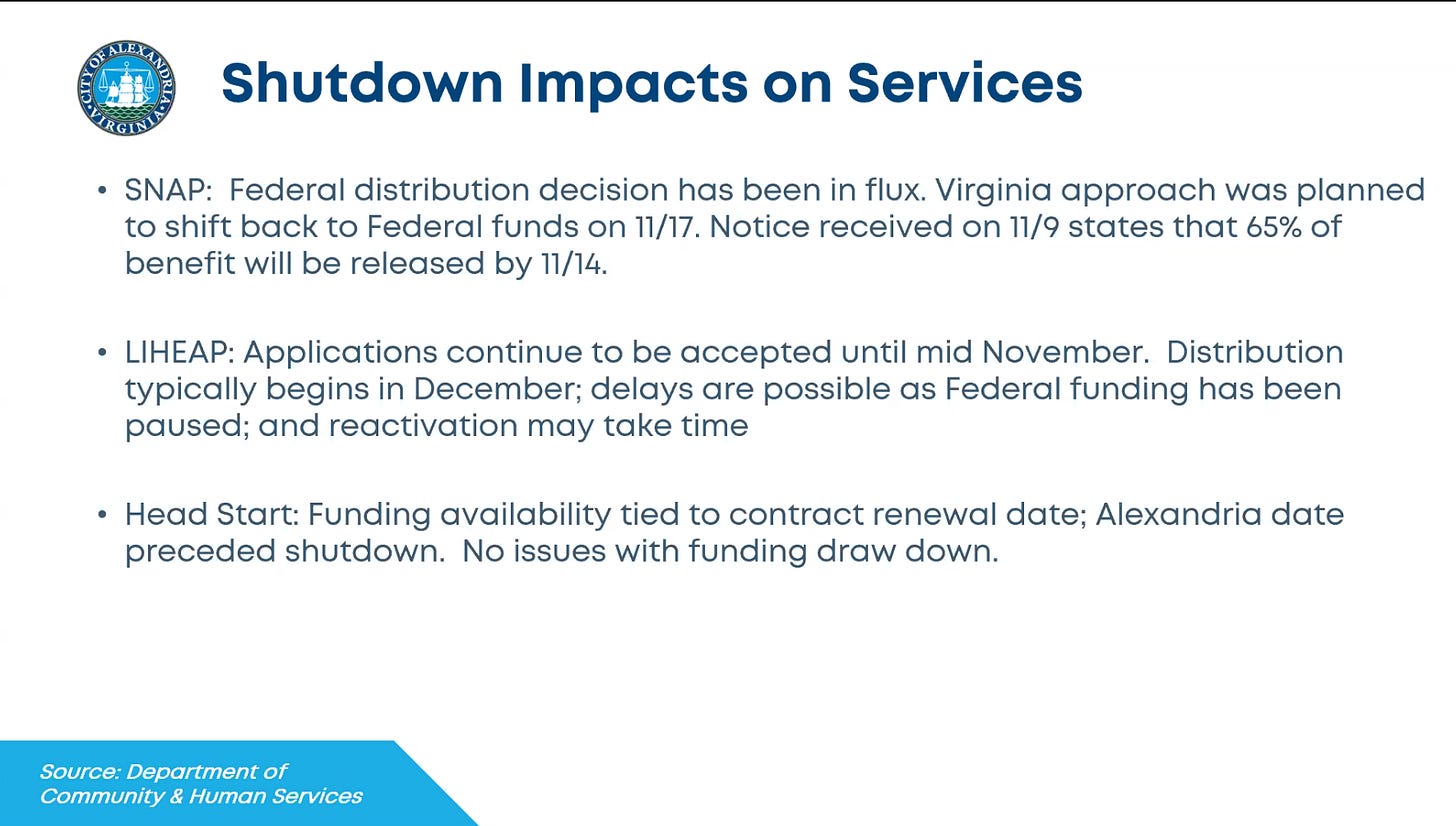
Looking ahead, Medicaid faces additional challenges with new redetermination requirements and work requirements beginning Dec. 31, 2026. Redeterminations of eligibility must be done every six months, and adults enrolled through Medicaid expansion will be required to engage in work-related activity.
“We do anticipate the loss of Medicaid benefits for some, but we are again trying to be as proactive as possible to engage folks,” Garvey explained.
Homeland security funding slashed
Homeland security funding faces dramatic cuts from a previously projected $45 million to $4 million. The D.C. region receives federal funds to enhance local public safety capabilities and regional preparedness. These funds support critical capabilities, including interoperable radios for the region.
Regional leaders are now prioritizing remaining funds. The city will have to absorb costs associated with critical capabilities in the absence of continued federal support, or discontinue some programs.
“I’m actually really proud of this work from a regional standpoint,” Parajon said. “The drop in these funds is significant, and we continue to work with all of our partners, both in Maryland, D.C., and Northern Virginia, to try to figure out how to prioritize the remaining funds.”
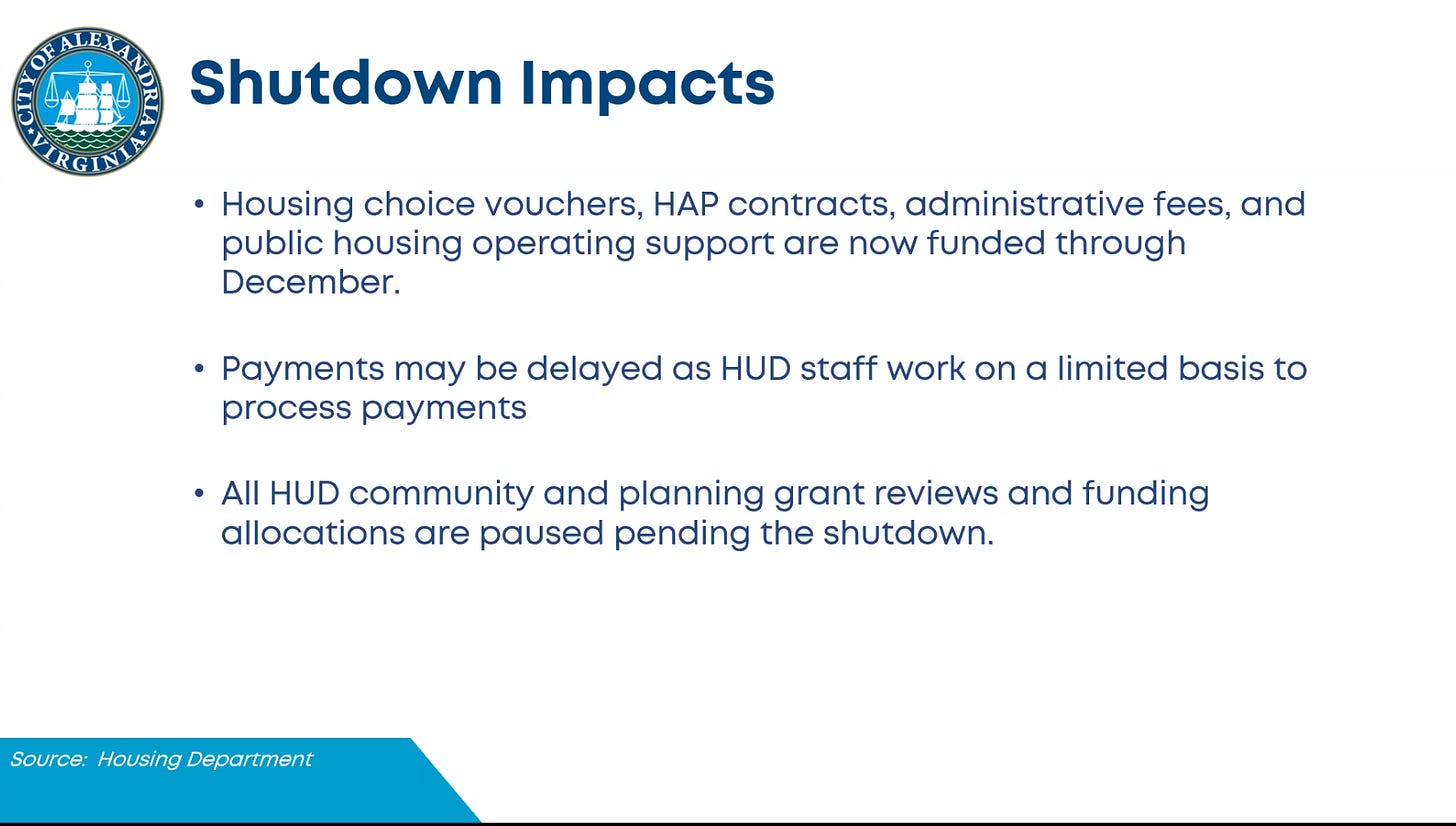
City response: payment plans and business support
The city’s finance department has implemented 71 car tax payment plans totaling approximately $89,000 to assist residents, with an average tax payment of about $1,254. The car tax deadline was Oct. 5, and real estate taxes remain due Nov. 17.
“We are continuing to look at where we might be able to deal with some payment plans beyond the car tax,” Parajon said. “And that’s something that we’re looking at depending on what happens with the shutdown.”
Residents affected by the shutdown can contact FedImpact-AlexTax@alexandriava.gov for assistance.
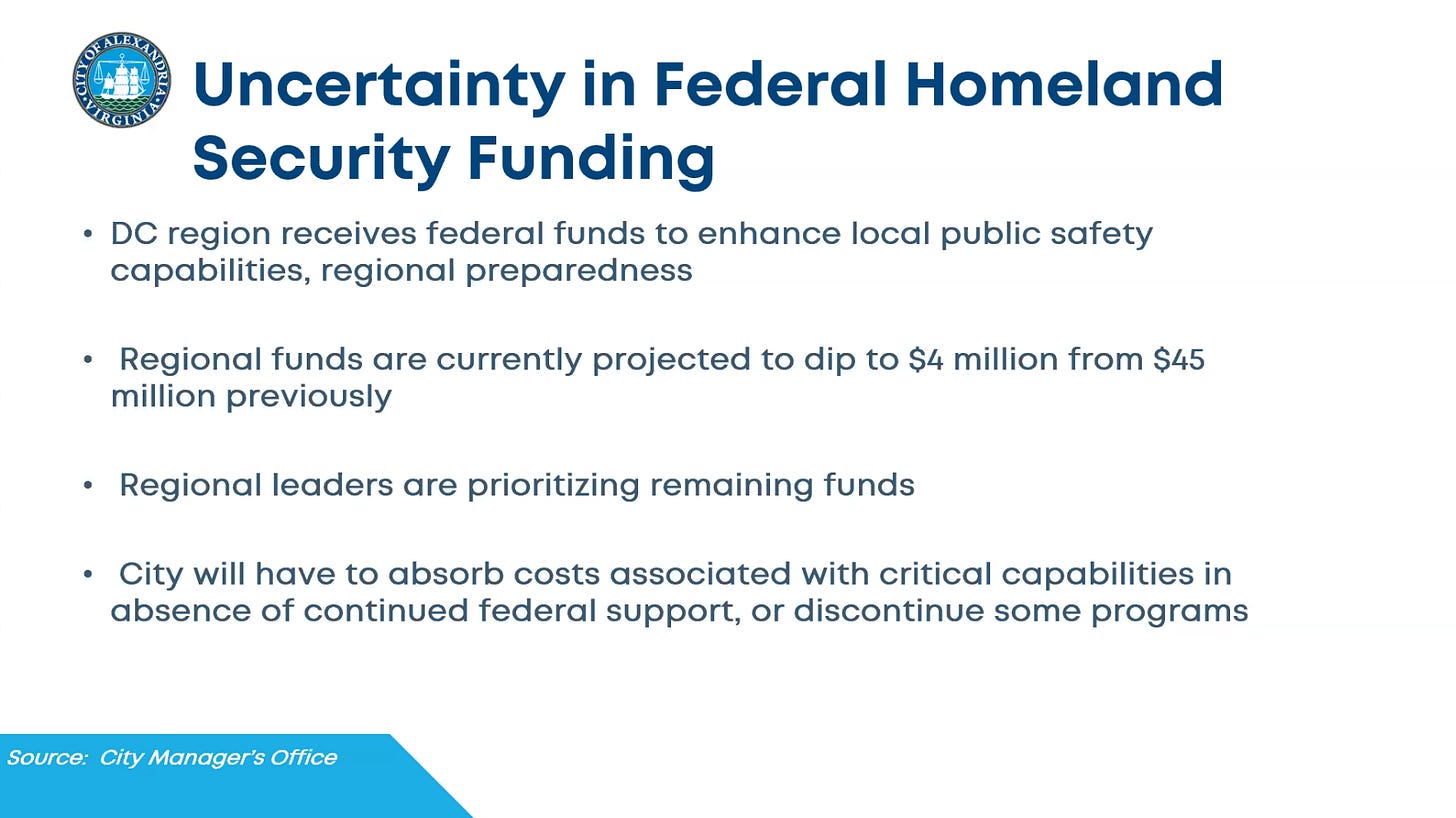
Active listings have grown to 366, up from 243 in September 2024 — a jump of almost 51%. Average 30-year fixed mortgage rates are around 6.26%. The market remains strong, with average days on market at 25 days (41% sold within 10 days), compared to 22 days last year.
Parajon noted the growth in listings potentially reflects federal dynamics but also pent-up demand from slightly lower interest rates.
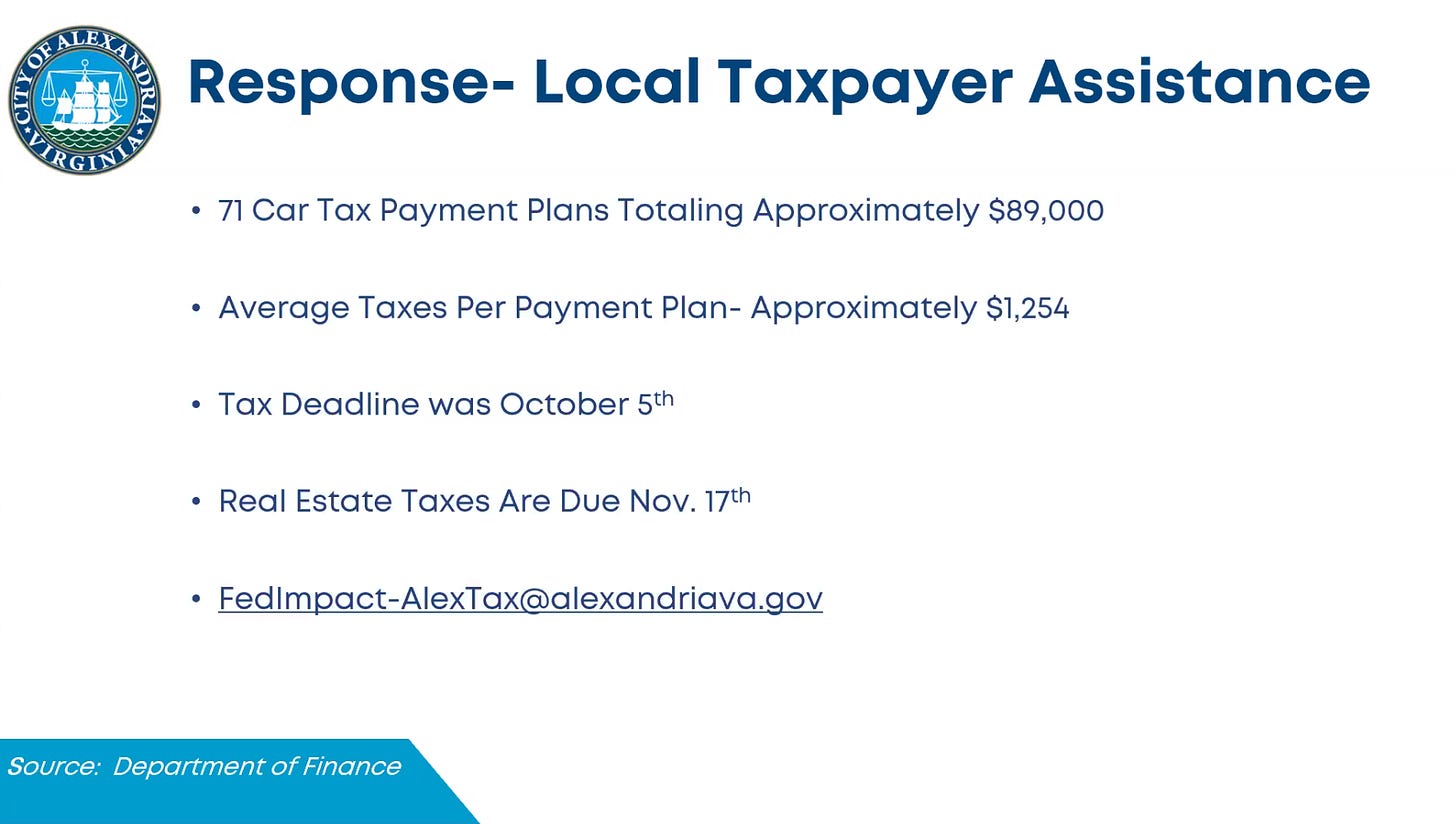
However, business entrepreneurship shows concerning trends, with only five new clients in recent economic partnership programs. Parajon attributed the low numbers to “the riskiness of entrepreneurship and the uncertainty that’s been created by both some of the federal policies and the uncertainty in the shutdown.”
The city has expanded support services for existing businesses and new entrepreneurs, including financial and operational guidance through cash flow triage sessions to help businesses forecast, prioritize, and manage expenses, and connections to local lenders, CDFIs, and state bridge loan programs. SBA programs are currently paused, but VSBFA and CDFIs remain active.
The Alexandria Economic Development Partnership is also providing counseling resources to help businesses navigate federal shutdown disruptions, along with workshops and webinars on customer loyalty, eVA procurement, and SWaM workshops.
The city plans to launch a new campaign in late November through the holiday season, promoting the Shop Alexandria Open rewards program to support local businesses. The campaign encourages local shopping and supports small businesses through the ALX Open Rewards app.
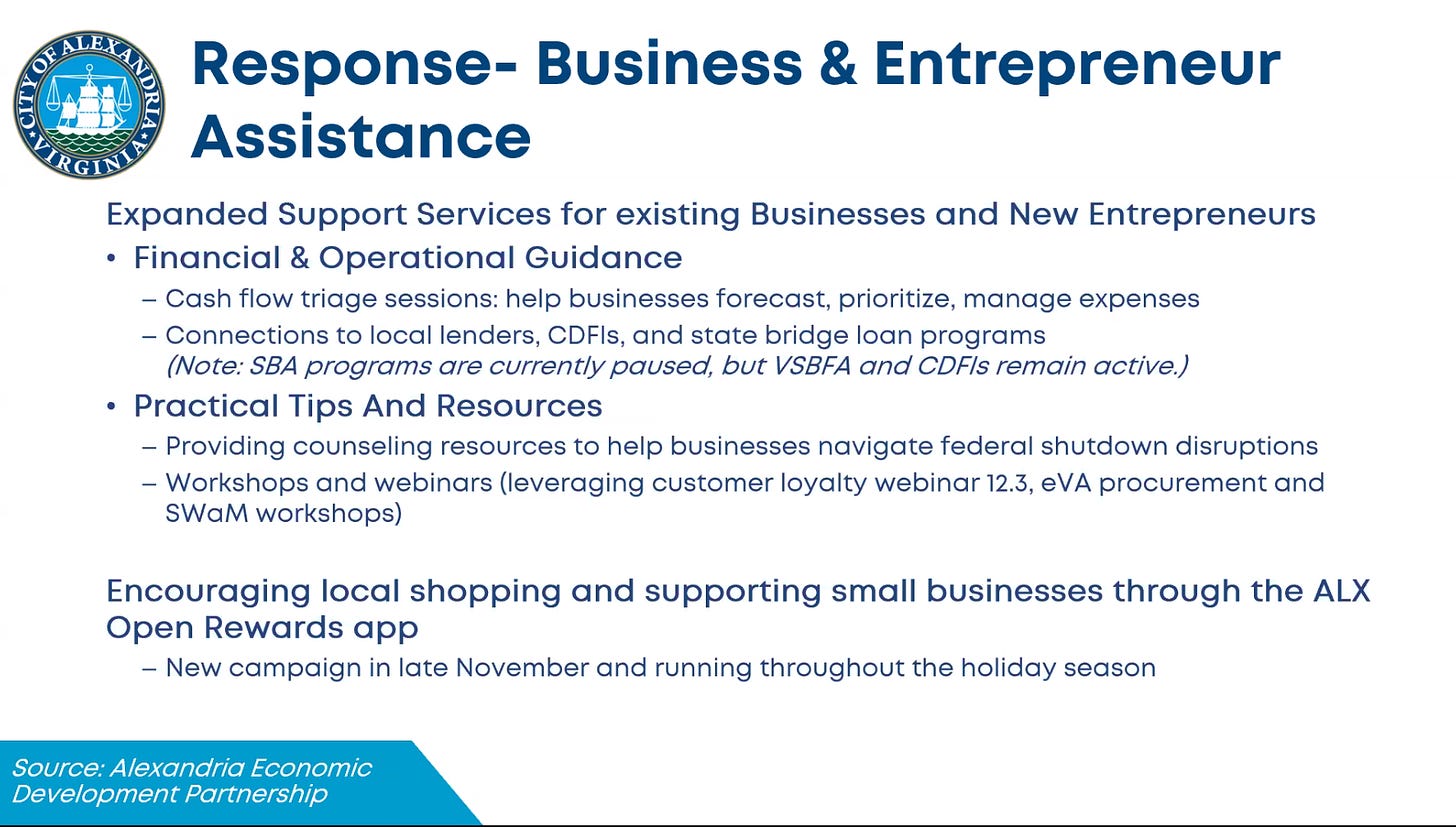
Looking forward
Mayor Alyia Gaskins inquired about additional policies needed to support federal workers beyond payment plans. Parajon suggested workforce services and small business entrepreneurship opportunities as potential areas for budget consideration, noting that property tax relief would be difficult, given that it represents over 60% of the city’s revenue.
Garvey added that rental and housing assistance needs will likely continue even after the shutdown ends. “I do think it’s going to take a while for things to get back on track for the federal worker side in terms of housing, you know, rental assistance and housing assistance.”
Parajon concluded his presentation — delivered just hours before Congress voted to reopen the government — with this assessment: “The message that we would provide to the community is that the shutdown has had a significant impact on our local businesses, our residents, and the workers. We continue to have uncertainty in the local market.”
With the shutdown now ending after 43 days, city officials expect it will take time for federal operations to return to normal and for the economic impacts on Alexandria residents and businesses to subside.

